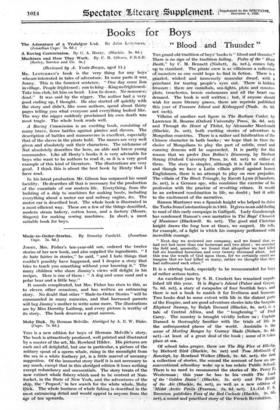Blood and Thunder "
Tun grand old tradition of boys' books is " blood and thunder." There is no sign of the tradition -failing. Pedro of the " Block Death," by C. M. Bennett- (Nisbett, 5s. net.), comes fully up to standard. The pirate crew is as villainous a collection oL monsters as one could hope to find in fiction. There is a gnarled, wicked and immensely muscular dwarf, with a -penchant for tearing people's eyes out. There is hidden
treasure ; there are cannibals, sea-fights, plots and counter- plots, treacheries, heroic endurances and all the heart can
demand. The book is well written ; but, if anyone should wish for more literary graces, there are reprints published this year of Treasure Island and Kidnapped (Nash. 3s. 6d.
net each). - .
Villains of another sort figure in The Radium Casket, by Lawrence R. Bourne (Oxford University Press, 2s. -6d. net) and Through the Heart of Thibet, by Alexander Macdonald. (Blaekie, 5s. net), both exciting stories of adventure in Mongolian countries. There is a rather sad falsification of the Chinese character in both books-;- we hope that in time the choice of Mongolians to play the part of subtle, cruel and cunning demons will be superseded.. It is partly -for this reason that we prefer Dan Bolton's Discovery, by Herbert Strang (Oxford University Press, 2s. 6d. net) to either of thein. The story is simpler, although it is full of incident, and though we have a Latin villain pitted against honest Englishmen, there is no attempt to play on race prejudice. The xillain of The Black Triangle, by Escott Lynn (Chambers, 5s. net), is a German spy, who combinea' the exercise of his profession with the practise of revolting crimes. It would be an awkward' combination in life, no- doubt ; but it addi to the excitement of the narrative.
Ramon Muntaner was a Spanish knight who helped to drive the Turks from Constantinople in 1303. It giVes man odd feeling to read of this early campaign in Gallipoli, 'Lady Goodenougll has condensed Ramon's own narrative in The Boys Chronicle of Muntaner -(Blackwell. 6s. net). The good and Christian knight draws the long bow at times, we suspect. He tells, for example, of a fight in which his company performed with incredible courage.
" Next day we reviewed our company, and we found that we had not lost more than one horseman and two afoot ; we searched the field and, assuredly, we found that altogether we had killed full six hundred horsemen and over twenty thousand. afoot. And this was the wrath of God upon them, for we certainly could not imagine that we had killed so many, rather we thought that they had suffocated each other."
It is a stirring book, especially to be recommended for boys of rather serious tastes.
An excellent yarn by S. R. Crockett has remained unpub- lished till this year. It is Rogue's Island (Faber and Gwyer,
7s. 6d. net), a story of escapades of four Scottish boys, and there is not a book to match it for liveliness and humour.
Two books deal to some extent with life in the distant parts of the Empire, and are good adventure stories into the bargain. Elephant Swamp, by Ralph Durand (Blackie, 6s. net), is a tale of Central Africa, and the " toughening " of Fred Carey. The country is brought vividly before us ; Captain Durand is thoroughly familiar with the trials .of life in the unfrequented places 'of the world. Australia is the scene of Marling Ranges by Gurney Slade (Nelson, 3s. 6d. net)--at least of a great deal of the book ; some of it takes place at sea.
Of school tales _proper, there are The Big- Five at Eller* by Richard Bird (Mackie, • 5s: net) and Tom McGrailh of Ranelegh, by Rowland Walker (Black, 2s. 6d. net), the first a collection of stories, the second the acceunt of how an un- conventional schoolboy woke up a too sedate Public School:
There is no need to recommend the stories of Mr. Percy F.
Westerman ; this year he has to his credit The Luck of the ' Golden Dawn' (Blackie, 5s. net) and The Riddle of the Air (Blackie, Os; net), as well . as a new edition of 'Midst Arctic Perils (Pearson. 8s. 6d. net). Lt.-Col. F. S. Brereton publishes Foes of the Red Cockade (Blackie, as. ode net), a sound- and practised story of the French Revolution:






























































 Previous page
Previous page